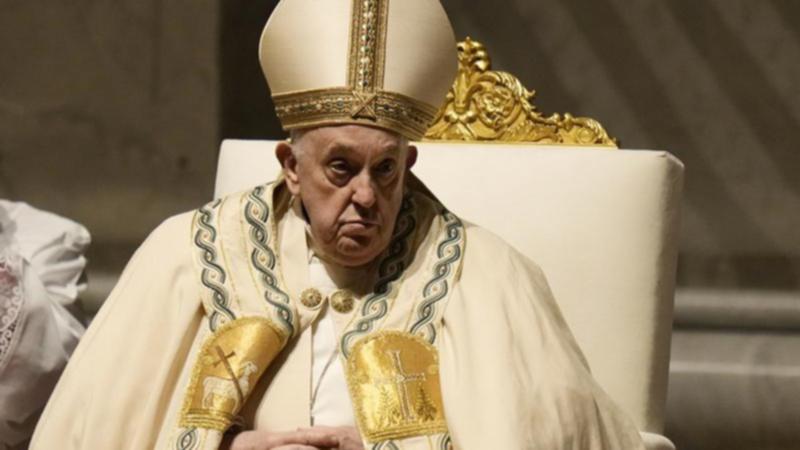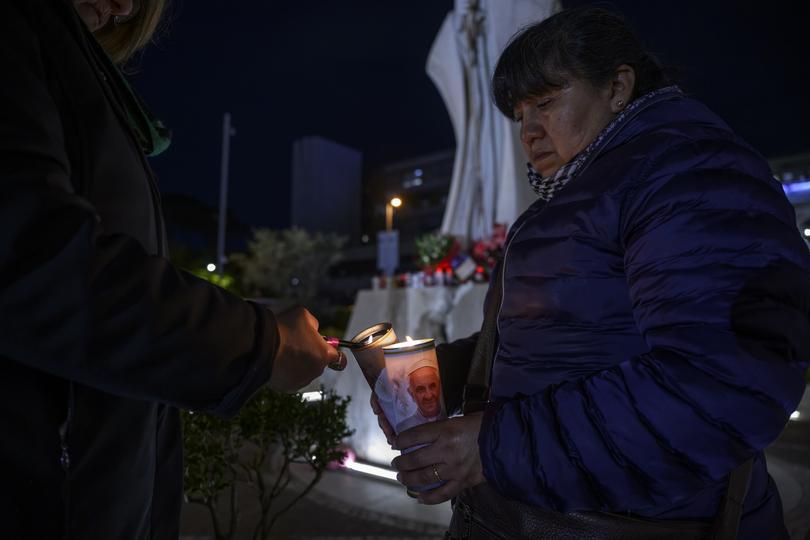Pope Francis: Update on medical condition brings infection fears among ‘respiratory crisis’
The brief update came after doctors said the pope, who had part of one lung removed as a young man, was in critical condition.

Sepsis is now believed to be the main threat to Pope Francis as the 88-year-old Pontiff recovers in hospital from a “respiratory crisis” that put him in a critical condition on Saturday.
The Vatican says Francis rested well during a peaceful night following a respiratory crisis and blood transfusions.
Vatican spokesman Matteo Bruni’s one-line statement didn’t mention if Francis was up or eating breakfast: “The night passed quietly, the Pope rested.”
Sign up to The Nightly's newsletters.
Get the first look at the digital newspaper, curated daily stories and breaking headlines delivered to your inbox.
By continuing you agree to our Terms and Privacy Policy.The brief update came after doctors said the pope, who had part of one lung removed as a young man, was in critical condition.
On Saturday morning, he suffered a prolonged asthmatic respiratory crisis while being treated for pneumonia and a complex lung infection.
The Pope received “high flows” of oxygen to help him breathe.
He also received blood transfusions after tests showed low counts of platelets, which are needed for clotting, the Vatican said in a late update.
The Saturday statement said that the Pontiff “continues to be alert and spent the day in an armchair although in more pain than yesterday”. Doctors said the prognosis was “reserved”.
Doctors have said Francis’ condition is touch-and-go, given his age, fragility and pre-existing lung disease.
They have warned that the main threat facing Francis would be the onset of sepsis, a serious infection of the blood that can occur as a complication of pneumonia.
As of Friday, there was no evidence of any sepsis, and Francis was responding to the various drugs he is taking, the Pope’s medical team said in their first in-depth update on the pope’s condition.
Saturday’s blood tests showed that he had developed a low platelet count, a condition called platelopenia or thrombocytopenia. Platelets are cell-like fragments that circulate in the blood that help form blood clots to stop bleeding or help wounds heal. He has been in Rome’s Gemelli hospital since February 14 after a weeklong bout of bronchitis worsened.
Amid his prolonged hospital stay, the Vatican hierarchy has attempted to quash speculation that Francis might resign.
There is no provision in canon law for what to do if a pope becomes incapacitated. Francis has said that he has written a letter of resignation that would be invoked if he were medically incapable of making such a decision.

Vatican secretary of state, Cardinal Pietro Parolin, gave a rare interview to Corriere della Sera to respond to rumours of secret meetings with the Pope in hospital. Given the canonical requirements to make a resignation legitimate, the implications of such a meeting were significant, but the Vatican flat-out denied that any such meeting occurred.
Cardinal Parolin said such speculation seemed “useless” when what mattered was the health of Francis, his recovery and return to the Vatican.
“On the other hand, I think it is quite normal that in these situations uncontrolled rumours can spread or some misplaced comment is uttered. I don’t think there is any particular movement ... I haven’t heard anything like that,” Cardinal Parolin said.
